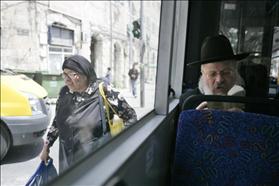A taxi for women only
After the buses: gender segregation reaches share taxis
The segregation between women and men does not end with the ‘Mehadrin Lines.’ Hiddush’s spokesman personally experienced segregation in share taxis: ‘I was removed from the vehicle after a single stop, because women would not let me sit next to them.’ Taxi drivers say segregation has them setting out with half-empty cabs
03/07/2011 10:36
Tags: segregation · haredim · Israel · Hiddush

A Haredi man sitting on a segregated bus in Jerusalem. 17.05.2010. Photo: Abir Sultan, Flash 90
Gender-segregated routes are operating not only on buses but also in the share taxis that run between Jerusalem and Bnei Brak. As on the buses, the men sit up front; the women in the back. On a bus, if no seat is available in the section intended for members of your sex, you can stand. In a share taxi, the segregation can end in the removal of a passenger mid-journey while the cab travels on half- empty.
That is what happened to Hiddush spokesman Assaf Musman. About a week ago Musman got into a share taxi to Jerusalem at the Bar-Ilan Interchange, and was removed from it at the next stop. The reason for this was that women sitting in the back refused to let him sit next to them, even though there was room. On this occasion the driver said to the passengers: “If this were your livelihood at stake, you’d move straight away. I’m constantly taking out half-empty cabs because of you.”
“I still haven’t recovered from the astonishment,” Musman says, “brutal behavior of removing a person from a public transport vehicle because of his sex befits a Third World country.”
In January of this year the High Court of Justice ruled in the matter of segregated bus routes that every person is entitled to sit wherever he or she chooses, and obligated drivers to take steps to prevent coercion or displays of violence. Additionally, the High Court ordered that signs be posted on
in quite a few cases, particularly when the victims are women, it ends in acts of bullying
buses announcing: “All passengers are entitled to sit anywhere they choose. Harassing a passenger on this matter may be a criminal offense.” In share taxis that pick up passengers from stops that cater mostly to the ultra-Orthodox public, but not only from these, there is no visible reference to the High Court order.
The head of Hiddush – Religious Freedom for Israel, Rabbi Uri Regev, said in response: “The segregation in share taxis demonstrates the degree to which supposedly voluntary segregation is actually forced segregation, which in the process is harmful to other passengers and the cab drivers. It also shows that there is no such thing as ‘ultra-Orthodox lines.’ The segregated routes also run through non-Haredi areas, and anyone who has to make use of them is subjected to arguments, unpleasantness, and sometimes, as in the case of Hiddush’s spokesman, is removed from the cab. Experience from the bus lines proves that in quite a few cases, particularly when the victims are women, it ends in acts of bullying.”
Regev demands that the Transportation Ministry “clarify to taxi drivers that it is their duty to prevent forced segregation and require them to post signs clarifying that passengers have a right to sit anywhere, as the High Court ruled with regard to the bus lines. The law makes no distinction between share taxi routes and the buses, and the question is whether the transportation minister genuinely intends to implement the law and High Court’s ruling.”